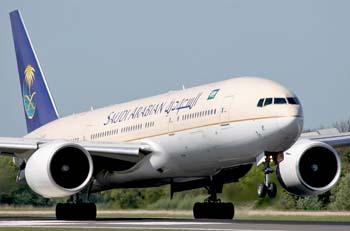 Jeddah, Apr 6: Saudi Arabian Airlines has no plans to raise domestic ticket prices since the domestic sector is not profit motivated, said a top official.
Jeddah, Apr 6: Saudi Arabian Airlines has no plans to raise domestic ticket prices since the domestic sector is not profit motivated, said a top official.
“Fares are pre-set and the carrier has no intention of raising prices,” said Saad Al-Suleiman, director of Passenger Service and Sales at Saudi Arabian Airlines.
Al-Suleiman was speaking at the launch of the airline’s first nonstop service from King Fahd International Airport (KFIA) in Dammam to Istanbul on Friday.
“Price hikes are confined to international flights and are not applicable to domestic flights,” he said. “The carrier views low-fare domestic flights as a type of national service as opposed to a profitable sector.”
Commenting on the latest announcement, Basil Al-Ghalayini, CEO of BMG Financial Group, pointed out that the entry of new airlines into the domestic market would offer an element of competition to the national carrier.
Al-Ghalayini said: This (Saudia fare) policy, otherwise called subsidy, is in line with the government's intention to allow the public to commute across the country without burdening them. This policy may continue until other alternatives are provided by the government such as the new pan-Kingdom train system.”
Al-Ghalayini, however, said the newly approved carriers might slightly fix their domestic fares higher than that of Saudia in return for better services.
Al-Suleiman also said new late-night services would operate from Dammam to Jeddah and Riyadh to provide connections for international flights.
“Small aircraft will be replaced by large aircraft with the increased number of services from KFIA to cope with regional demand,” he said.
According to John Sfakianakis, chief investment strategist at a Riyadh-based investment firm, any additional player in the domestic airlines sector should be good for the consumer “as long as there is a level-playing field for all players.”
He said: “Domestic fares are already low and it is hard to expect any downward pressure in the future. It is hard to expect significantly higher price because new airlines have to compete with the existing fare system.
“The domestic fare pricing system is cutthroat and one-sided. What could change is the customer experience, timeliness and service by the new providers.”
Saudia says three direct weekly flights will operate between Dammam and Istanbul, which will be upgraded to daily flights from next year. “The airline also plans to operate four nonstop flights from Dammam to Beirut, two weekly flights to Amman and seven more weekly flights to Cairo,” said Al-Suleiman.






Comments
Add new comment